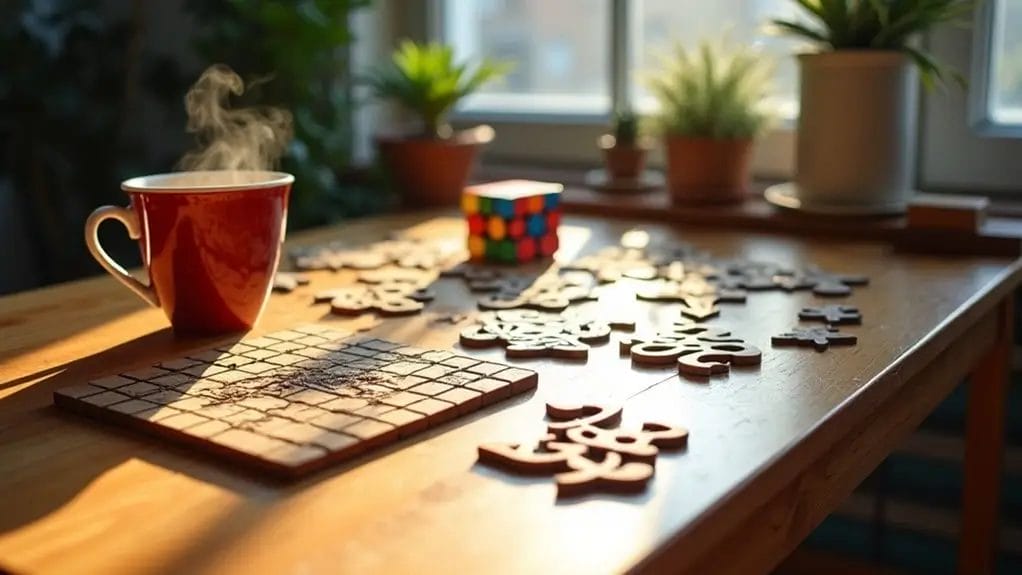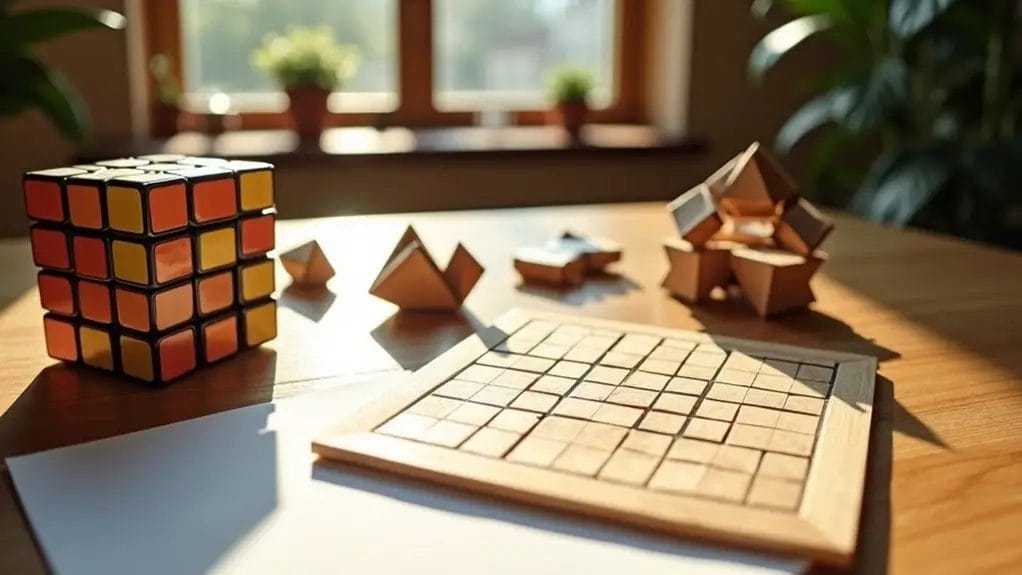
Have you ever heard that puzzle-solving can boost your IQ? But not all puzzles offer the same cognitive benefits. Specific types of puzzles target different areas of mental performance, from spatial reasoning to mathematical aptitude.
If you want to improve your problem-solving skills or boost your memory, knowing which puzzles match your goals can greatly help your mental growth. Let's explore the most effective options for boosting your intelligence.
Key Takeaways
- Logic puzzles like Sudoku and riddles boost IQ by 4 points in 25 minutes.
- Mathematical puzzles enhance numerical reasoning and analytical skills.
- Spatial puzzles improve visual and spatial imaging ability and problem-solving abilities.
- Digital puzzle games provide accessible cognitive enhancement through apps.
- Combination puzzles activate both brain hemispheres by integrating multiple skills.
Why Exercise Your Brain?

Physical exercise strengthens your muscles. Similarly, exercising your brain through solving puzzles is essential for maintaining and enhancing cognitive function.
Regular mental exercise helps create new neural pathways. It enhances your problem solving skills and memory retention.
Furthermore, you'll protect your brain against cognitive decline as you age. This might reduce your risk of dementia.
This mental stimulation creates lasting benefits. It enhances your focus and analytical capabilities for both personal and professional success.
What Types of Puzzles Increase IQ? 9 Different Types

Different puzzles target various aspects of intelligence. Let's look at several ways.
1. Logic Puzzles
Many puzzle types can boost intelligence. But logic puzzles are a great way to increase IQ scores. When you solve Sudoku and riddles, you engage in critical thinking processes. This activity helps strengthen your cognitive skills.
These challenges require you to analyze information systematically, identify patterns, and draw logical conclusions.
2. Mathematical Puzzles
Mathematical puzzles represent one of the most potent tools for enhancing IQ scores. They combine numerical reasoning and pattern recognition challenges. Regular engagement helps you develop better problem-solving skills and sharpen your analytical thinking.
These puzzles can strengthen your logical reasoning. They need you to identify patterns and adapt strategies.
Mathematical puzzles offer diverse cognitive benefits, from basic arithmetic to complex logic problems. These puzzles enhance your working memory and mental agility. They're invaluable for both academic and professional growth.
3. Crossword Puzzles
Crossword puzzles stand out for their unique ability. They enhance verbal intelligence and memory retention.
As you regularly engage with these puzzles, you'll see significant improvements in your cognitive development. They have been scientifically proven to increase IQ scores.
When you solve crosswords, you enhance your problem-solving abilities. This activity also helps protect against memory decline. This can be important for preventing dementia.
The process of analyzing clues and identifying patterns sharpens your critical thinking skills. Crossword puzzles are an invaluable resource for improving your mental acuity.
4. Spatial Puzzles
Spatial puzzles represent a powerful category of cognitive enhancement tools. They directly boost visual-spatial intelligence and overall IQ scores.
When you engage with these puzzles, you're strengthening neural connections. They can enhance your visual-spatial reasoning and problem-solving skills.
By manipulating shapes and understanding spatial relationships, you can strengthen your cognitive abilities. These skills are critical for intellectual growth.
There are many benefits to playing wooden jigsaw puzzles for your body, mind, and spirit. Hand-eye coordination and finger strength develop during this process.
5. Brain Teasers
Brain teasers are also powerful cognitive enhancement tools. They directly target various aspects of intelligence. When you engage with these puzzles regularly, you'll experience measurable improvements in your ability to solve problems and your IQ scores.
These mental challenges strengthen your memory retention while developing critical analytical skills. They need unique thinking patterns, forcing your mind to create new neural connections.
6. Strategy-Based Puzzles
Strategy-based puzzles directly impact your IQ development. Engaging with chess and Sudoku strengthens your problem-solving abilities and critical thinking skills.
Research shows that these puzzles stimulate significant analytical regions in your brain. They foster new neural connections that contribute to cognitive skill improvement.
7. Memory Puzzles
Memory puzzles can directly affect your IQ development, too. Research shows you'll gain about 4 IQ points after just 25 minutes of engagement.
When you work on jigsaw puzzles, you strengthen neural pathways through spatial and visual recognition. This process enhances your memory recall capabilities.
Regular practice sharpens your focus and concentration while boosting your problem-solving abilities.
Your cognitive skills improve as you engage with various memory-based challenges. These puzzles are particularly effective for overall intelligence enhancement.
8. Digital Puzzles and Apps
In today's digital age, interactive puzzle apps offer unprecedented access to cognitive enhancement tools right at your fingertips.
Brain training games focusing on spatial reasoning sharpen your visual-spatial abilities. Meanwhile, digital crosswords enhance verbal skills and memory retention.
You'll find that regularly using puzzle apps strengthens many cognitive skills simultaneously. All these apps provide structured ways to enhance your mental capabilities.
9. Combination Puzzles
When you engage with combination puzzles, you're activating both brain hemispheres. They boost cognitive abilities and neural connectivity.
These puzzles integrate various skills, including logic, pattern recognition, and spatial reasoning. You'll develop stronger problem-solving skills and critical thinking.
Regular practice improves your mental agility and adaptive thinking. This leads to better performance in academic and professional challenges.
How Can You Choose the Right Puzzle Game?
Now, you've learned about different types of puzzles. Choosing the right puzzle can make a big difference:
- Identify Your Interests: Think about what excites or relaxes you. Do you prefer word games, logic puzzles, pattern matching, or something visual like jigsaw puzzles?
- Consider Your Skill Level: Choose a game that matches your experience. Beginners may enjoy simpler puzzles, while experts might look for more challenging options.
- Purpose of Playing: Are you playing to relax, improve cognitive skills, or compete with others? Pick a game that aligns with your goals.
- Time Availability: Pick games with shorter levels if you have limited time. For longer playtimes, more complex games might be suitable.
- Platform Preference: Decide whether you want a physical or digital puzzle.
- Age Appropriateness: If buying for children, check the age rating and complexity.
- Multiplayer or Solo: Decide if you want a solo challenge or to game with friends or family.
- Theme and Aesthetics: Choose a theme and design that appeals to you.
- Replay Value: Some games are enjoyable only once. But others provide endless variations or new challenges. Consider what you prefer.
Conclusion
Regularly engaging with diverse puzzle types is key to maximizing your cognitive enhancement. Incorporate logic, crossword, and memory puzzles into your routine. Thus, you can systematically develop different aspects of intelligence.
Select puzzles that challenge you appropriately. So you'll strengthen your problem-solving abilities, memory retention, and overall cognitive function.
FAQs
Which Game Increases IQ Most?
Jigsaw puzzles are also considered to enhance intelligence. They can improve spatial awareness, logical thinking, and problem-solving skills. By working on puzzles, players need to analyze shapes and colors and predict how different pieces fit together, which helps boost cognitive abilities.
Are Puzzles Good for IQ?
Yes, puzzles are excellent for your IQ. Regularly working on puzzles boosts your critical thinking, memory, and problem-solving skills. This leads to measurable cognitive improvements.